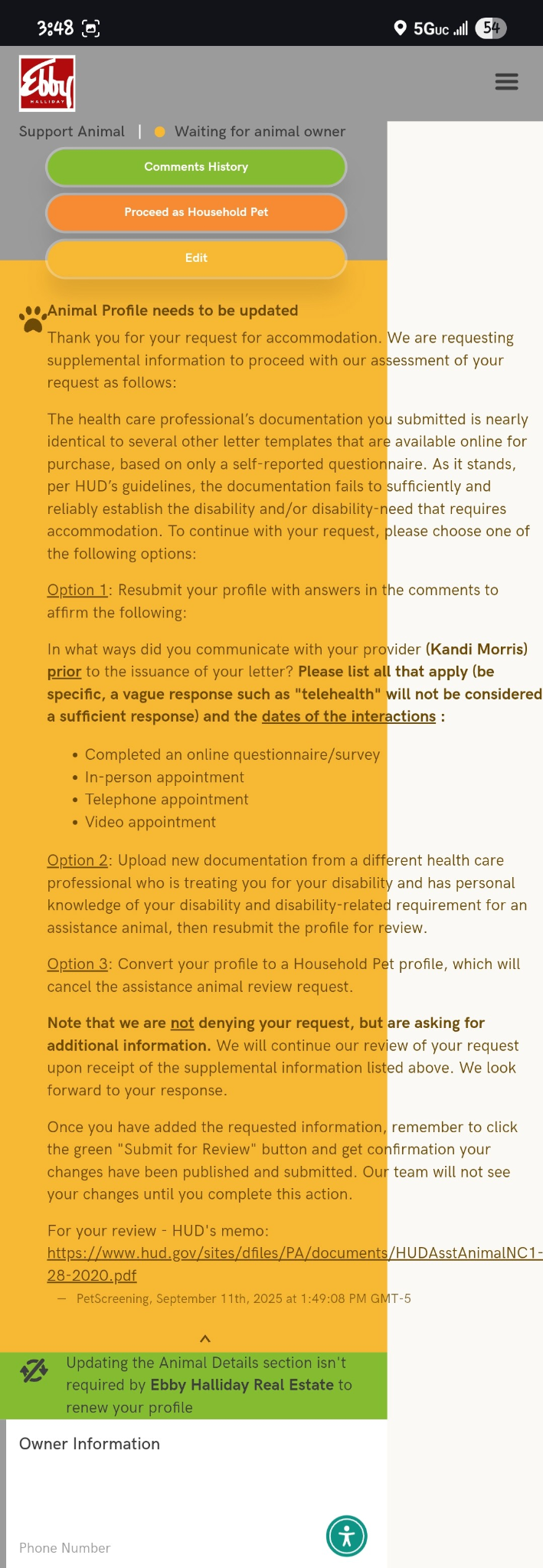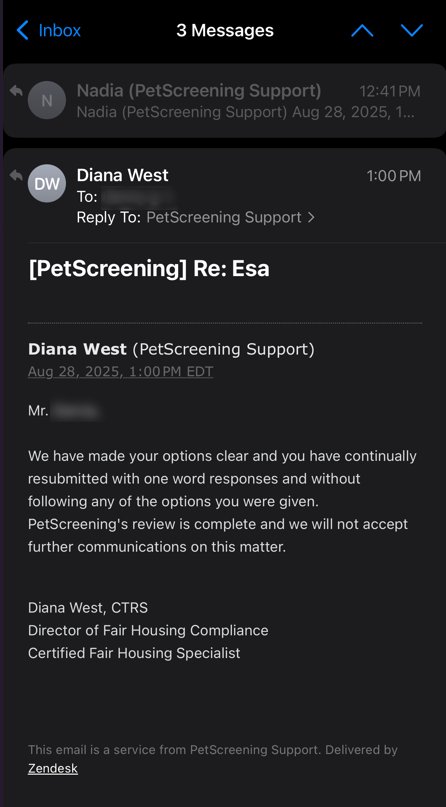From Bathroom Bills to Fido's Bills: Meet the Architect of Pet Rental Screening Fees
How One Politician-Turned-Landlord Helped Build Pet Rental Screening Fees for Big Property Interests and Against Everyday Renters with Pets

- Vote Record: Bradford Sponsors Outrageous NC Law That Forces People to Use Bathrooms That Match Their Genitalia
- "An unmitigated disaster." The national reaction to John Bradford's sponsored North Carolina Bathroom Bill
- Ethics Complaint Filed Against John Bradford
- Housing rights group believes Rep. John Bradford would financially benefit from a landlord-tenant bill he filed
- Bradford Votes to Siphon $500K of NC Disaster Relief to Pay for Legal Defense of NC Notorious Bathroom Bill
- 7 reasons voters should fire John Bradford
- In Debate Bradford Declares of his prematurely born children: "extreme radicals" would have wanted him to "abort his babies."
Landlords Beware: PetScreening May Cost You More Than It Saves

Sept. 2025
7 min read
Instead of protecting landlords, PetScreening's model exposes them to enforcement actions, lawsuits, and tenant complaints.
A Tenant's Experience With PetScreening
Imagine this: you have been working with a licensed mental health professional. After intake, evaluation, and professional judgment, your clinician determines that you qualify for an Emotional Support Animal (ESA). Under federal law, the Fair Housing Act (FHA), that letter is valid documentation entitling you to a reasonable accommodation in housing.
But instead of handing your letter to your landlord and moving forward, you are told you must upload it into PetScreening.com, a third party platform hired by your property manager. What should be a simple federally protected process suddenly turns into a maze of false choices, supplemental forms, and dismissive responses.
One tenant's recent experience shows how PetScreening's model can create barriers to rights guaranteed by law.
The "False Choice" Notice
When this tenant uploaded a valid ESA letter from a state licensed clinician, PetScreening responded with a notice. The message said the letter was "nearly identical to other templates available online" and therefore "failed to sufficiently and reliably establish the disability and or disability related need."
PetScreening then gave the tenant three "options":
- Resubmit details about provider communications by disclosing when, how, and how often they spoke to their clinician, with vague responses like "telehealth" explicitly rejected
- Get a new therapist and submit fresh documentation from another licensed professional
- Convert the ESA into a "household pet profile" by effectively giving up legal protections and paying pet fees
Nowhere in this notice did PetScreening acknowledge the truth: their service is optional. Tenants are not required by law to use PetScreening. They can give their ESA documentation directly to their landlord.
When One Tenant Pushed Back
When the tenant pushed back, responding that their ESA documentation was valid, PetScreening's customer service team, led by a representative titled "Director of Fair Housing Compliance," sent a final message:
"We have made your options clear… PetScreening's review is complete and we will not accept further communications on this matter."
This is more than a poor customer service response. It is an outright denial of engagement, shutting down dialogue on a matter that is supposed to involve an interactive process under federal housing law. HUD guidance specifically requires landlords and their agents to work with tenants in good faith, not dismiss them with "PetScreening's review is complete and we will not accept further communications on this matter."
PetScreening Email Response
What HUD Actually Says
HUD's 2020 guidance (FHEO 2020 01) is clear:
- Housing providers may not demand specific forms, detailed medical histories, or disclosure of provider patient interaction logs
- A letter from a licensed health professional with personal knowledge of the tenant's disability and need is considered reliable documentation
- If the disability or need is obvious, no documentation at all may be required
In other words: if you have a valid ESA letter from a clinician who meets HUD's standard, you have already satisfied the law. Any additional hurdles may constitute unlawful housing discrimination.
PetScreening's Own Terms of Service Admit It
Here is the kicker: PetScreening's own Terms of Service contradict the process tenants experience. The fine print states:
"You are not required to submit this information in any specific form… The use of Pet Screening to submit your reasonable accommodation request is elective and optional. If you wish to work directly with your housing provider instead of working directly with Pet Screening then you are free to do so… If you cannot or do not want to use our service to submit your reasonable accommodation request then no further action with Pet Screening is needed."
But tenants are rarely told this. Instead, they are funneled into PetScreening's system, given ultimatums, and pressured to disclose more information than HUD permits.
Why This Is a Bigger Problem
This is not just about one tenant. PetScreening's model raises fundamental concerns:
- Disregard for Clinicians: Licensed mental health professionals issue ESA letters after proper evaluation. PetScreening often dismisses these as "templates" or "unreliable," effectively second guessing medical judgment
- Imposing Unlawful Demands: Supplemental forms asking for detailed provider patient interaction records exceed HUD's scope of inquiry
- Tortious Interference: By telling tenants to seek new providers, PetScreening undermines clinician patient relationships and disrupts business for ESA platforms that employ licensed professionals
- False Choices: Tenants are told they must comply with one of PetScreening's options, when in fact the service is optional
- Personal Information (PI) Exploitation: When a prospective tenant applies to a multifamily property that uses PetScreening, they submit their personal information in good faith as part of the rental application process. But they are never told the property manager is sharing their personal information with a third party vendor, PetScreening, that monetizes the tenant's personal information with affiliate and other third party offers
What Tenants Should Know
If you are a renter with an ESA:
- You do not have to submit to PetScreening. Their own Terms of Service confirm this. You may deliver your ESA letter directly to your landlord
- You cannot be forced to disclose diagnosis, treatment history, or provider patient communications. HUD guidance protects your privacy
- You are entitled to an interactive process. A vendor cannot shut down your request with a dismissive email
- You can file a HUD complaint if you believe your rights have been violated
A System Based on Fear
PetScreening markets itself to landlords as a shield against "fraudulent" ESA letters. But in reality, the platform often shifts liability back onto property managers. If PetScreening unlawfully rejects an ESA request, it's the landlord who will be named in a HUD discrimination complaint.
Meanwhile, tenants are left feeling powerless — forced to navigate a private company's unsavory business practices rather than the clear standards set by federal law, much less PetScreening's own terms and conditions.
Conclusion
PetScreening exists legally as a business. But when its practices:
- reject valid ESA documentation,
- impose unlawful demands,
- hide the fact that participation is optional,
- monetize tenant data, and dismiss tenants' rights with "we will not accept further communications"
it undermines the very laws designed to protect renters with disabilities.
Compliance should mean protecting rights, not blocking them. Until PetScreening aligns its process with HUD's clear standards, both tenants and landlords remain at risk — and the conversation around ESA rights will continue to be defined not by federal law, but by a private company's profit model.

